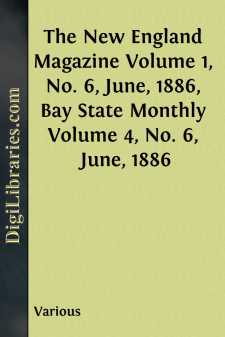Categories
- Antiques & Collectibles 13
- Architecture 36
- Art 48
- Bibles 22
- Biography & Autobiography 813
- Body, Mind & Spirit 142
- Business & Economics 28
- Children's Books 15
- Children's Fiction 12
- Computers 4
- Cooking 94
- Crafts & Hobbies 4
- Drama 346
- Education 46
- Family & Relationships 57
- Fiction 11829
- Games 19
- Gardening 17
- Health & Fitness 34
- History 1377
- House & Home 1
- Humor 147
- Juvenile Fiction 1873
- Juvenile Nonfiction 202
- Language Arts & Disciplines 88
- Law 16
- Literary Collections 686
- Literary Criticism 179
- Mathematics 13
- Medical 41
- Music 40
- Nature 179
- Non-Classifiable 1768
- Performing Arts 7
- Periodicals 1453
- Philosophy 64
- Photography 2
- Poetry 896
- Political Science 203
- Psychology 42
- Reference 154
- Religion 513
- Science 126
- Self-Help 84
- Social Science 81
- Sports & Recreation 34
- Study Aids 3
- Technology & Engineering 59
- Transportation 23
- Travel 463
- True Crime 29
The New England Magazine Volume 1, No. 6, June, 1886, Bay State Monthly Volume 4, No. 6, June, 1886
by: Various
Categories:
Description:
Excerpt
Williams College has something peculiar and romantic in its history, as well as in its site amid the beautiful hills of Berkshire. It had its birth upon the very frontiers of civilization, and amid the throes of that struggle which was to decide finally whether the control of this continent, and the permanent shaping of its institutions and its destiny were to be French or English. The nascent colleges of Colorado, Dakota, and Oregon are relatively to-day in the position held by Williams when it was founded.
Col. Ephraim Williams, from whom the college takes its name, had been an active participant in the struggle to which we have alluded. He had been commissioned by the General Court of Massachusetts to construct and command a line of forts along the northern border of settlements from the Connecticut River on the east to the valley of the Hoosac on the west. This line coincided nearly with the northern boundary of Massachusetts; all above, to the borders of Canada, being then a wilderness, through which the roaming savages often burst with sudden violence upon the settlements of the English colonists. The westernmost of the line of forts was not far from what is now the site of the college, and this, being the most exposed and most important, Williams commanded in person.
After acting in this capacity for a time, and in a manner which gained him much distinction in the colony, he was placed in charge of a regiment of troops, designed to participate with other forces in an expedition against the French; the special object being the capture of Crown Point, a fortress on Lake Champlain. While on the way to Crown Point a French force was met, near the head of Lake George. Williams, with a detachment of troops, was sent against it. The movement was successful. The French were repulsed, but in the encounter Williams lost his life. A monument, erected in recent years by the alumni of the college, marks the spot where he fell.
From Harper's Magazine. Copyright, 1881, by Harper & Brothers.CLARK HALL.
While engaged in his military duties on the frontier, Williams became much interested in the soldiers under his command. Through his agency chiefly, two townships of land in the vicinity of Fort Massachusetts—the name given to the most western fort in the valley of the Hoosac—had been set off by order of the Legislature, and lots in them had been disposed of to the soldiers on favorable terms. Williams had also expressed the intention of still further benefiting his comrades in arms. While resting for a day or two at Albany, on his way to Crown Point, he bethought him of his purpose, the execution of which had hitherto been postponed. Accordingly, he made his will on the spot, by which he devised his property, after making some bequests to relatives and friends, for the purpose of establishing what he termed a Free School.
From Harper's Magazine. Copyright 1881, by Harper & Brothers.East College. EAST COLLEGE CAMPUS. Library.
Such was the beginning of Williams College, for the school took the name and form of a college in two or three years after its organization. It was noble in purpose from the outset, but humble, indeed, in pecuniary endowment. Some will smile, now that we think hundreds of thousands, not to say millions, necessary for the establishment of a college, when they are informed that the executors of Williams' estate were obliged to allow the proceeds of it to accumulate for thirty years before they ventured to organize the school or erect a building for its use.
...











